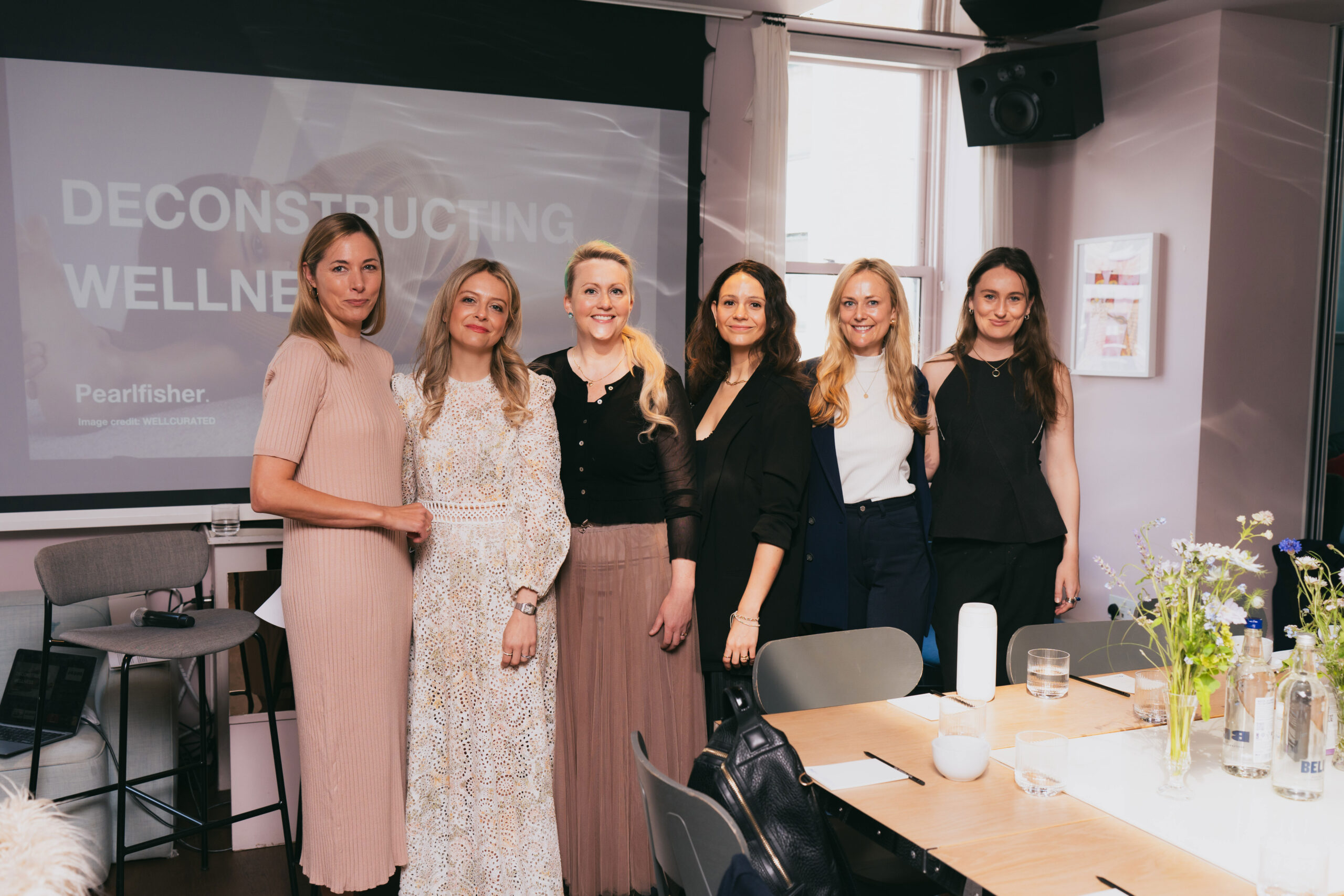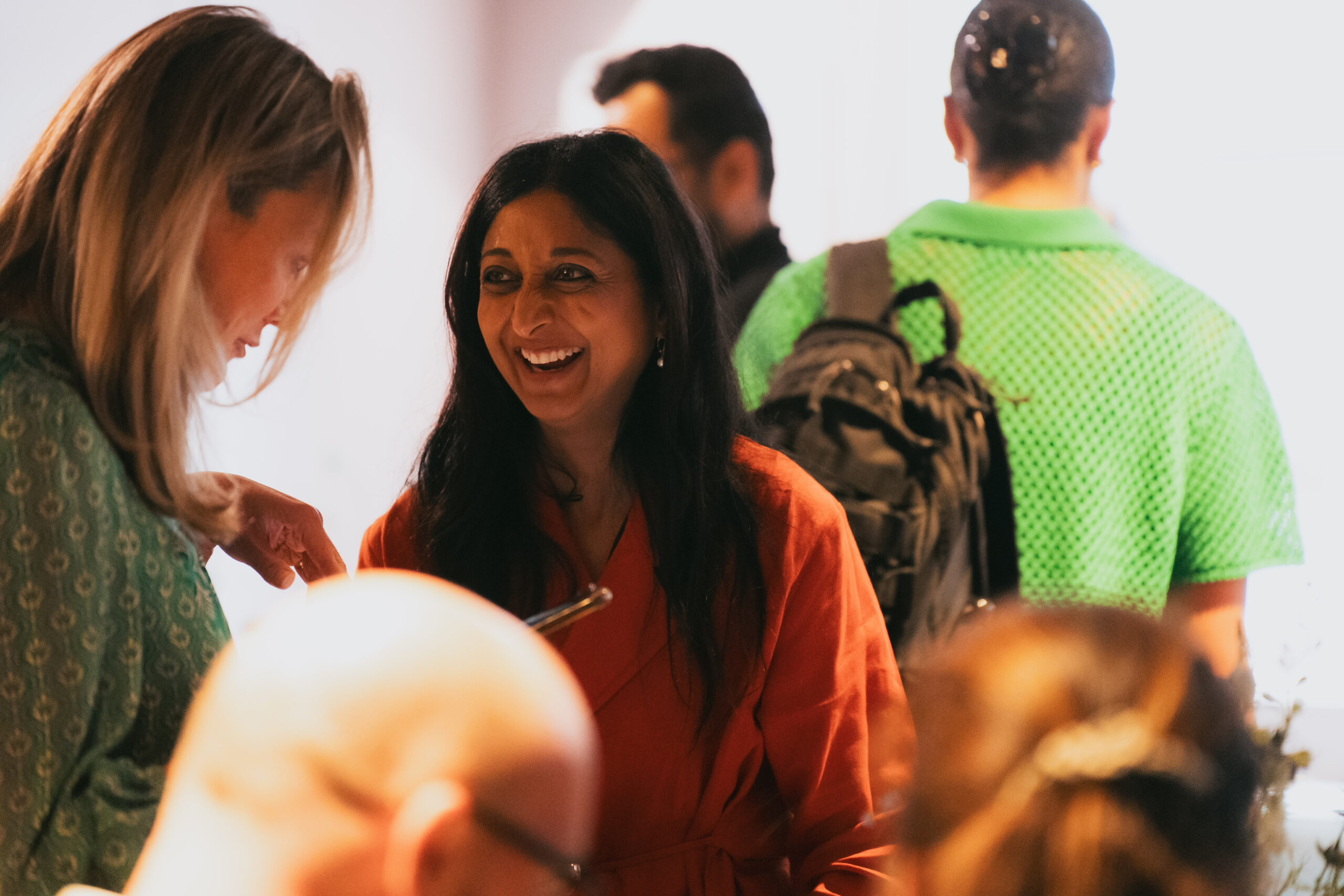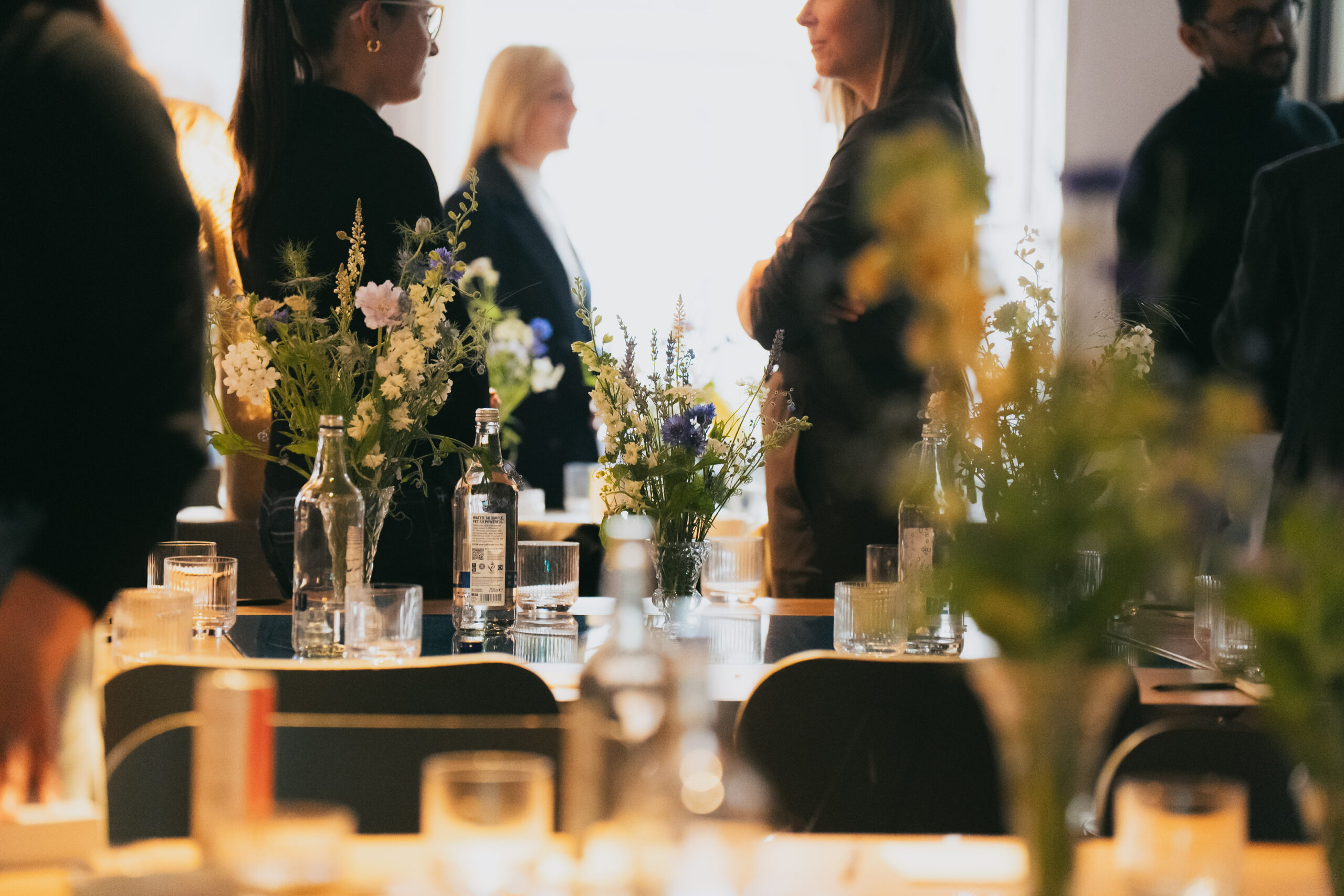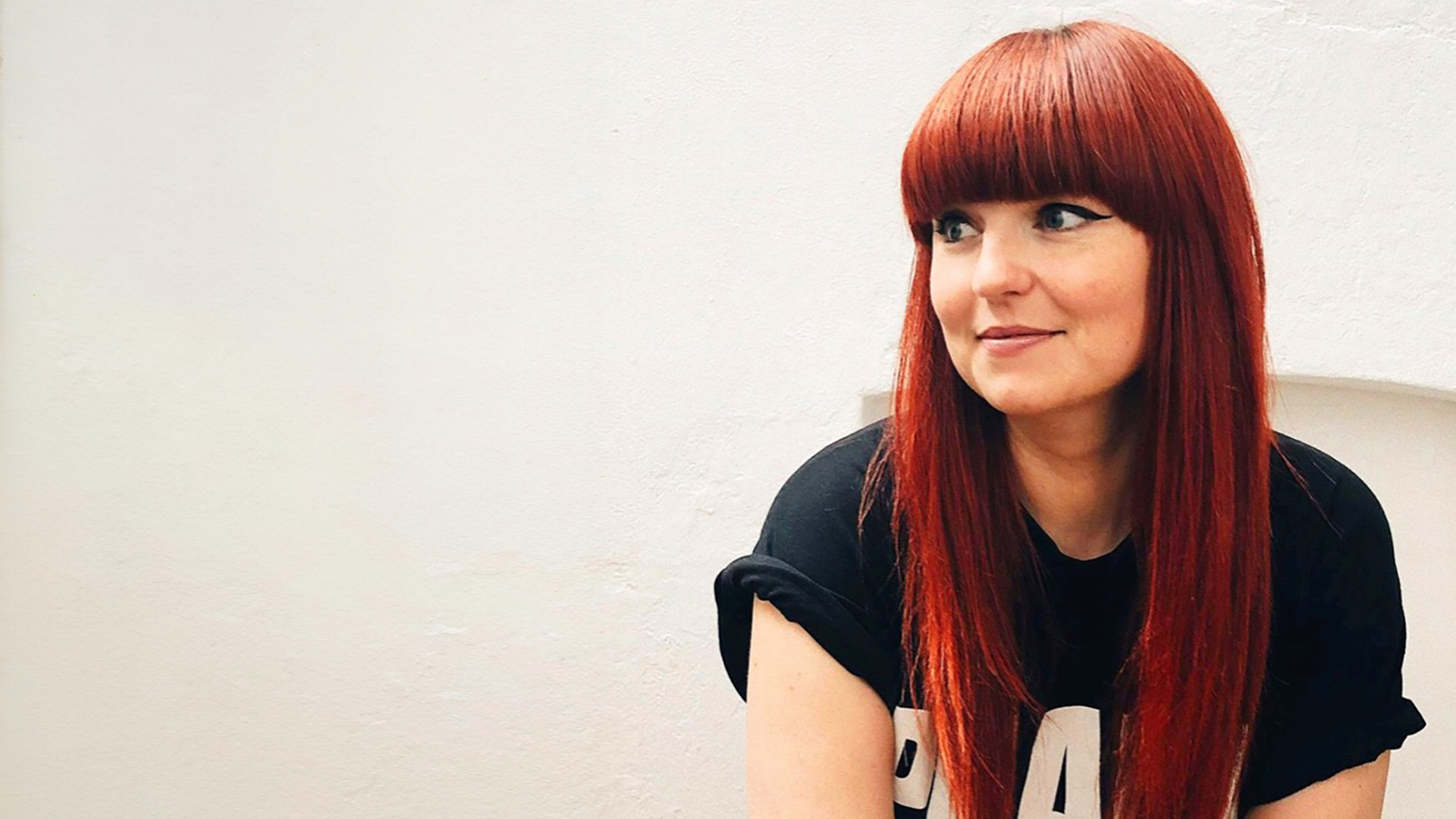Yesterday, Pearlfisher hosted the third event in its Deconstructing series. Led by Pearlfisher’s Futures team, the series invites an expert panel to share and deconstruct their personal brand experiences and cutting-edge insights within their respective fields. Whilst previous events have focused on themes of beauty and luxury, this session delved into the rapidly evolving wellness category, now a $5.6 trillion global industry (Source: The Global Wellness Institute).
From hype to wellness hacks to new-generation medical-grade products, the wellness category is becoming increasingly expansive, infusing more sectors than ever before. Evolving from its initial more premium perception to becoming accepted at a mass market level – according to the Global Wellness Institute, £1 in every £16 spent by consumers worldwide is now spent on wellness.
Sophie Maxwell, Pearlfisher’s Partner of Futures & Insight, started the discussion on what drives brands in today’s competitive, multichannel market and the key connections between brands and consumers.
Pearlfisher’s Deconstructing Wellness Panel:
- Claudia Canavan, Health & Wellness Director at Women’s Health & Men’s Health UK
- Gemma Colao, Co-Founder & Chief Brand Officer at OTO Wellbeing
- Stefanie Mach, Managing Director at luxury skincare and spa brand Natura Bissé
- Sarah Welsh, Co-Founder & Doctor of sustainable sexual wellness brand HANX
Here’s a snapshot of the key takeaways from the event and our speakers:
From Short-Term Hacks to Long-Term Wellness Journeys
The conversation started by exploring the key drivers and connection points for brands in the wellness industry – from launching new products in emerging categories like CBD and sexual wellness to redefining the role of wellness in luxury skincare, the panel shared their insights on the challenges and opportunities they face in this evolving landscape.
Educating consumers and breaking down barriers is crucial, especially when launching a new category like CBD. Brand and packaging design plays a significant role in building consumer trust and conveying premium quality. “The packaging was a real challenge to move away from all these cannabis-related tropes, like green leaves, and actually design something truly beautiful,” shared Gemma Colao, Co-Founder & Chief Brand Officer at OTO Wellbeing.
Claudia Canavan, Health & Wellness Director at Women’s Health & Men’s Health UK, shares what should be driving both existing and new-to-world brands: “For me as a journalist, what really stands out in the wellness space is when I can see a cool, interesting, smart new solution to a pre-existing problem. Things that offer some kind of focus on streamlining really capture my attention. Genuine environmental impact is also really important. I love it when brands speak to an existing issue.”
There is a significant opportunity for brands to destigmatise and reframe women’s health, from sexual wellness to menopause. Creating safe spaces for open conversation and education is crucial. “Sexual wellness is often overlooked when you talk about wellness and wellbeing. It’s a key indicator of general health because it includes and is influenced by physical wellness, mental, emotional, and social impacts,” explained Sarah Welsh, Co-Founder & Doctor of sustainable sexual wellness brand HANX.
Stefanie Mach, Managing Director at luxury skincare and spa brand Natura Bissé, shared her perspective on how wellness became a key driver for the brand: “We have always gone beyond only skincare and have actually collaborated with other industries, looking for innovations in different spaces that can be potentially applied to the wellness industry.”
Longevity and Improving Our Quality of Life
Wellness is increasingly used to address cultural changes and the demands of modern lifestyles, and consumers are shifting from clean products to those with clinical validation, driving innovation through science and technology. While longevity is the wellness buzzword for 2024, the ultimate goal remains to improve quality of life and promote healthier, longer lives.
Stefanie Mach, Managing Director at luxury skincare and spa brand Natura Bissé, discussed results-driven wellness and how Natura Bissé measures the effects of their treatments on overall well-being by analysing brain activity, heart rate, cortisol levels, and oxytocin levels, showing a 70% improvement. She also highlighted that consumers now expect offerings tailored to their unique biology, life stage, and goals. “Consumers are incredibly knowledgeable… They want facts, they want stats, and they are willing to invest if you can prove results,” Stefanie Mach said.
Brands should map out consumer journeys and create products that seamlessly fit into people’s daily lives and routines. OTO’s “focus, amplify, and balance” approach exemplifies this strategy. “We really want to create thoughtful and effective products that fit seamlessly into people’s lives. We spent a lot of time with our consumers, mapping out their day, their challenges, and how they interact with the world. This deep insight allows us to design products that directly connect with the consumer’s needs, making wellness not feel like work but a seamless part of their daily routine,” Gemma Colao, Co-Founder & Chief Brand Officer at OTO Wellbeing, emphasised. “Wellness shouldn’t feel like work—it should seamlessly enhance your life.”
The Emerging Acknowledgement of Pleasure in Wellness
There is a recognition now that wellness has got a little complicated, maybe even anxiety-inducing, with a shift away from trusting our bodies and towards images of perfection.
Claudia Canavan, Health & Wellness Director at Women’s Health & Men’s Health UK, responded on how wellness brands should look to facilitate meaningful connections and shared experiences, both on and offline. “I fully agree that much of wellness has become super anxiety spiking. What we also need to be healthy and happy people is to be in a community and to be with other people. Brands can put on events and talks and places where people can come and actually meet with a community. It’s really important to recognise that people do want to be together and to talk about their health and their wellness,” Claudia Canavan said.
Sarah Welsh, Co-Founder & Doctor of sustainable sexual wellness brand HANX, touched on modern views and representations of self-care and well-being in this sector. “Sex and intimacy can be part of our general self-care routine. Pleasure is different for everyone and doesn’t always have to be about sex. Our products aim to engage in all the milestones of women’s health and intimate well-being, embracing nuanced views around female pleasure, which is constantly evolving and fluctuating,” Sarah Welsh explained.
The Future Drivers of Innovation in Wellness
The morning concluded with final remarks from our wonderful panel on what’s next for their brands and the wellness sector.
“For us, it’s about understanding how the body and mind connect. We’re focusing on exciting new ingredients that balance both, such as adaptogens and nootropics. Our goal is to offer products that address health inside and out—what you ingest and what you put on your skin. By doing things differently and breaking down barriers, we aim to provide comprehensive wellness solutions that integrate body and mind,” said Gemma Colao, Co-Founder & Chief Brand Officer at OTO Wellbeing.
“We aim to make spa experiences an essential part of holistic wellness, combining services like breathwork and sound healing with treatments. Innovation drives us, and we’re constantly looking for new active ingredients while staying committed to sustainability. The future holds incredible opportunities, and we’ve only scratched the surface,” shared Stefanie Mach, Managing Director at luxury skincare and spa brand Natura Bissé.
“I would love to see more momentum around women innovating in areas where they have lived experience. The potential to change lives is huge. Funding should go into female founders, female research, and women’s health. We need to destigmatise women’s health and sexual health in both research and startups, and emphasise sex education, pleasure, and consent from an early age,” stated Sarah Welsh, Co-Founder & Doctor of sustainable sexual wellness brand HANX.
“I think there’s going to be much more emphasis on the inner world. There’s a new lab at Harvard dedicated to the science of advanced meditation—not just mindfulness, but intense meditative states that promote significant human flourishing and well-being. A study found that 45% of people surveyed had altered state experiences through yoga, meditation, and breathwork. These experiences, often associated with profound mental shifts, are becoming more common and impactful,” said Claudia Canavan, Health & Wellness Director at Women’s Health & Men’s Health UK.
A huge thank you to our amazing panellists and we look forward to hopefully seeing you at our next Deconstructing event.
To learn more about Pearlfisher’s Deconstructing event series, please get in touch:
Nicole Wilson, Business Development Manager: nicole.w@pearlfisher.com













